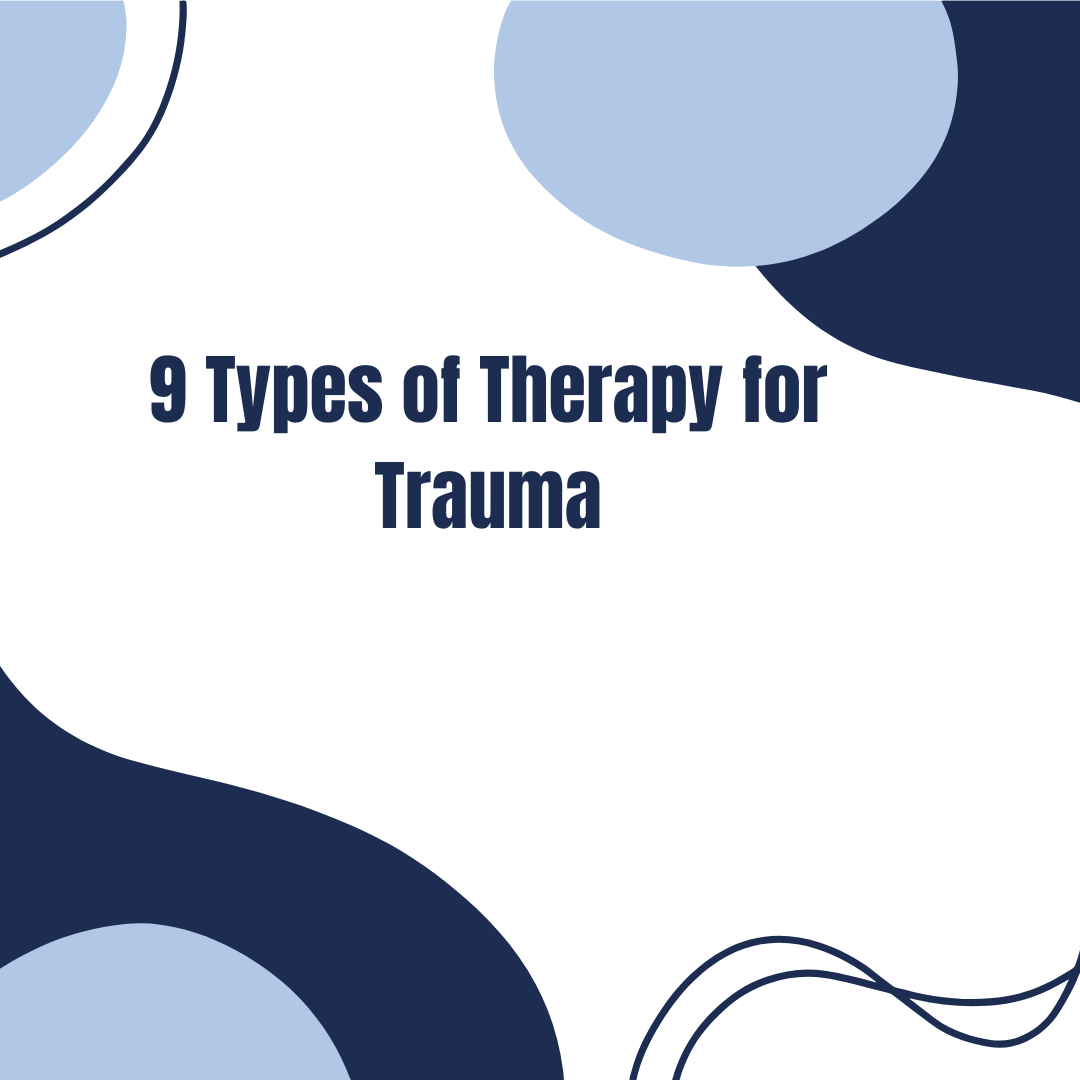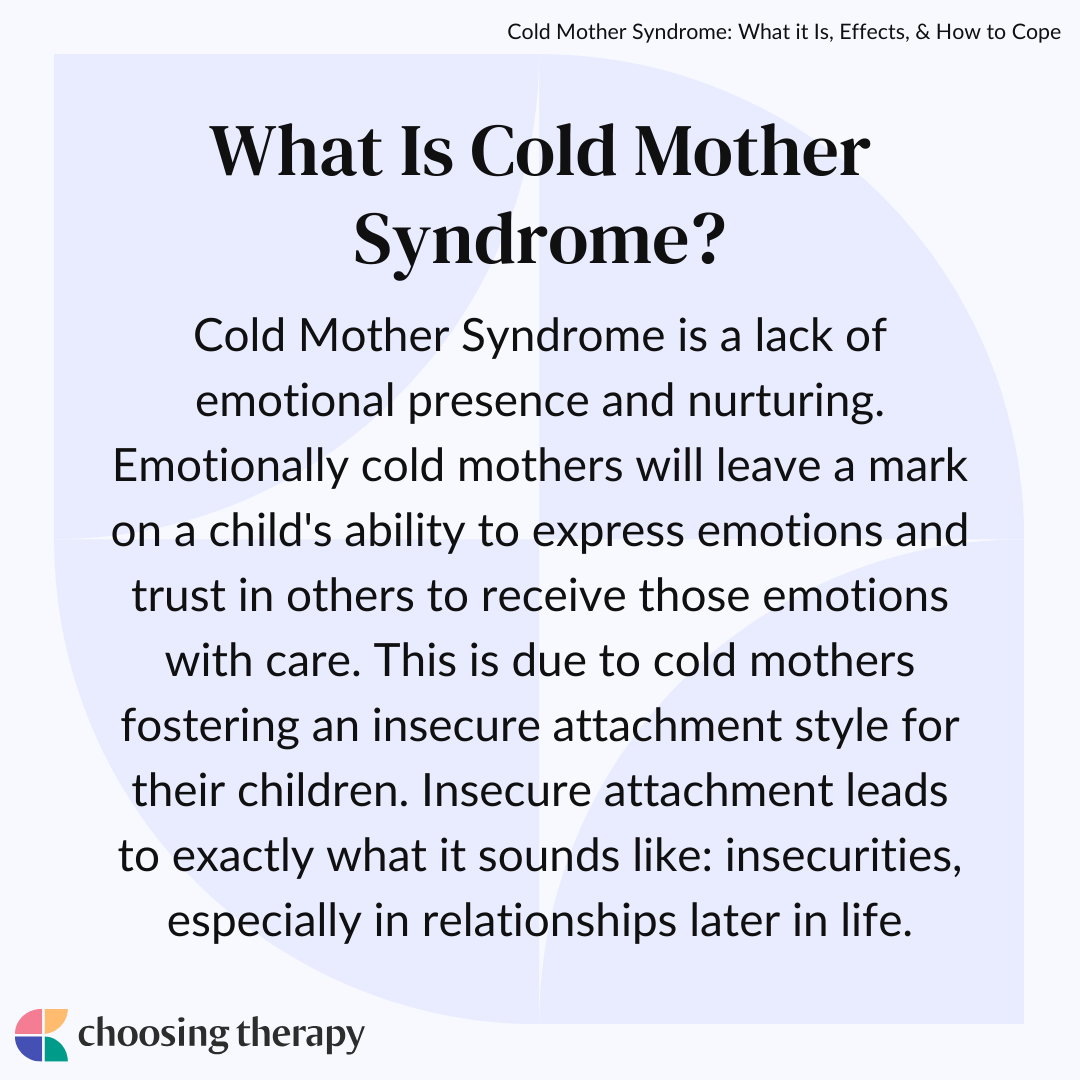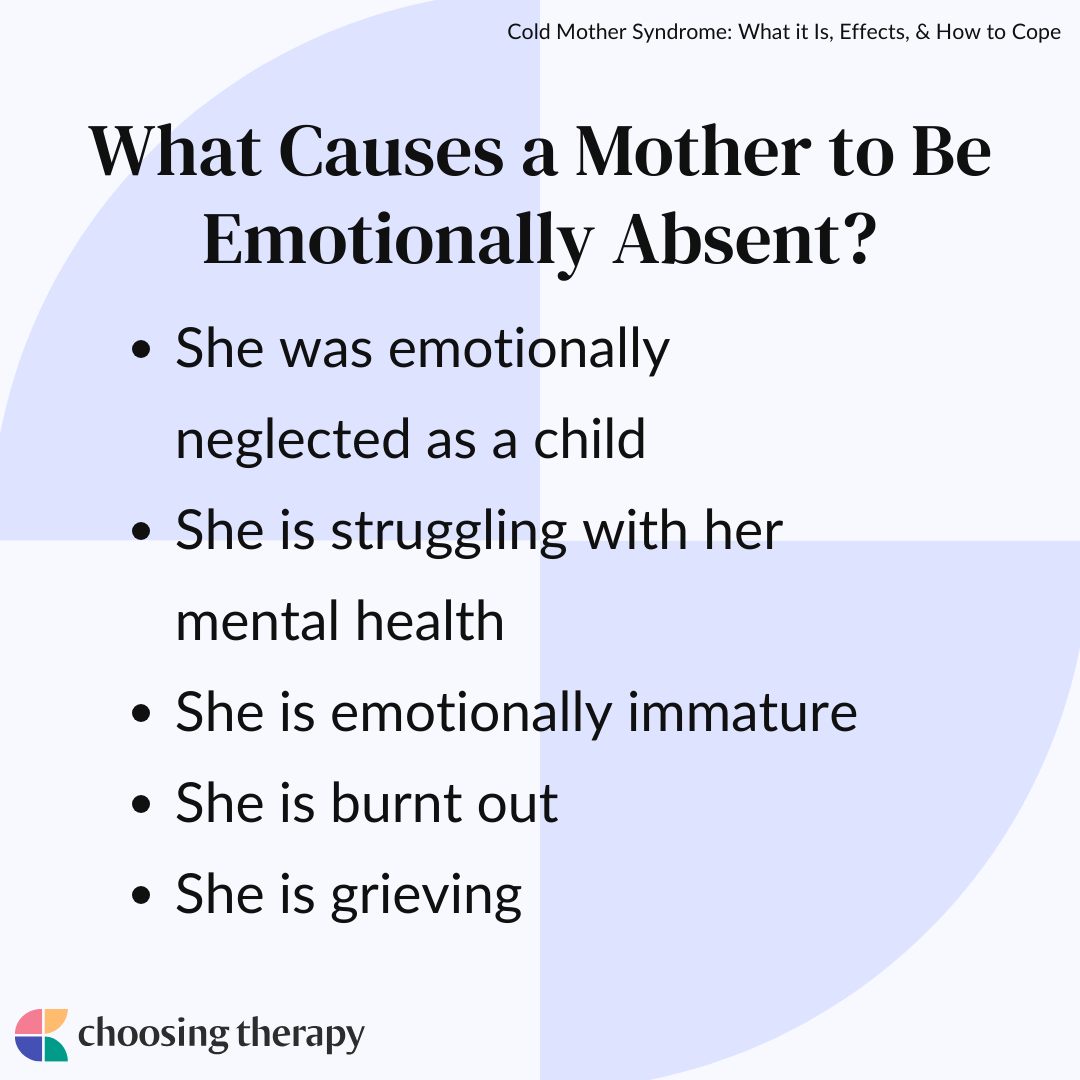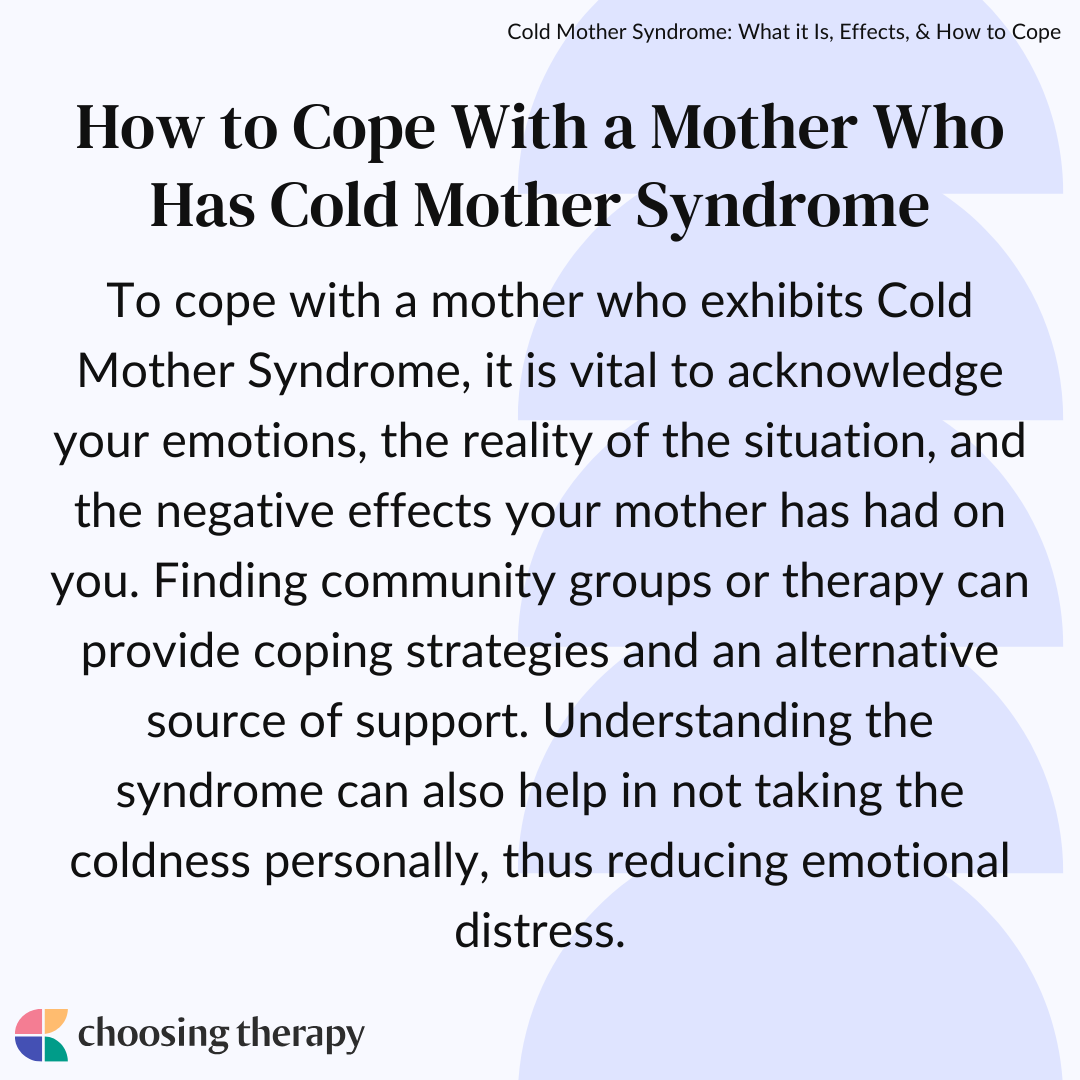Cold Mother Syndrome is where one’s maternal figure is emotionally absent. Emotionally cold mothers put a psychological distance between themselves and their children. Cold mothers may not appear happy, fulfilled, or excited by their children’s growth and accomplishments. This coldness leaves a lasting effect on children with respect to psychological and emotional well-being later in life.1
Childhood trauma Is difficult to overcome. Therapy can help you live a better life. BetterHelp provides convenient and affordable online therapy, starting at $65 per week. Take a Free Online Assessment and get matched with the right therapist for you!
What Is Cold Mother Syndrome?
Cold Mother Syndrome is a lack of emotional presence and nurturing. Emotionally cold mothers will leave a mark on a child’s ability to express emotions and trust in others to receive those emotions with care. This is due to cold mothers fostering an insecure attachment style for their children. Insecure attachment leads to exactly what it sounds like: insecurities, especially in relationships later in life.2
How Common Is Cold Mother Syndrome?
Statistics around the commonality of Cold Mother Syndrome are relatively unclear. However, certain diagnoses in childhood, ranging from disruptive mood dysregulation, depression, and oppositional defiance, have been correlated with emotionally unavailable mothers across studies and meta-analyses.3, 4, 5 Therefore, it is not a leap to say that children experience emotionally cold mothers at a startling rate.
What Are the Symptoms of Cold Mother Syndrome?
Cold Mother Syndrome may look slightly different from mother to mother. However, the general landscape of the symptoms boils down to emotional unavailability. A cold mother is often physically present. However, beyond the physical presence, there is little to no emotional connection from mother to child.6
Symptoms of Cold Mother Syndrome include:6
- Wears a Mask: Emotionally unavailable mothers will mask their coldness with a presentation of attentiveness through other means. For example, ensuring the basic needs of children are met and providing material comforts.
- Exhibits emotional dysregulation: Emotional Dysregulation entails overreacting to emotional stimuli in an inappropriate and self-destructive manner. When children of cold mothers show emotions, the cold mother will often yell, scream, and intimidate to stop the child’s emotions from happening altogether.
- Withholds guidance: Children need mentoring throughout their life. However, children of cold mothers are essentially tasked to “figure it out.” Thus, children are left to emotionally fend for themselves.
- Appears disconnected: Cold mothers are disconnected emotionally, spiritually, and psychologically from their children.
- Acts robotically: A cold mother may appear as if they are driven by a motor. Their movements and motions are mechanical in nature, adding to the feeling of disconnection.
- Lacks accountability: Cold mothers are often unable to be self-reflective. This means their insight into how their coldness affects their children is little to none.
What Causes a Mother to Be Emotionally Absent?
Emotionally absent mothering can occur for many different reasons. Contributing factors may include mental health conditions like depression or anxiety and societal pressures. Additionally, mothers who were raised by emotionally absent mothers are likely to continue this trend due to intergenerational trauma.6 Additionally, financial stress or relationship issues can exacerbate a mother’s emotional unavailability.
Here are five reasons a mother may become emotionally absent:
1. She Was Emotionally Neglected as a Child
A mother being emotionally neglected as a child can lead to cold mother syndrome. This happens due to the difficulties with attachment an emotionally neglected child will experience in their later relationships. This is especially true as certain patterns in families are transmitted throughout generations.2
2. She Is Struggling With Her Mental Health
A mother struggling with her mental health can lead to cold mother syndrome. Certain mental health diagnoses have symptoms associated with emotional numbness. Others bring on emotional disconnect due to recurrent life stressors.7 Whatever the case may be, mental health concerns can be vast yet treatable.
Mental health disorders that can cause cold mother syndrome include:
- Depression: Depression is often a chronic and recurrent condition. One of the key symptoms of depression is numbness. When a person feels numb, their overall emotional landscape is dulled. This can bring about cold mothering due to the lack of emotions a mother may experience when depressed, especially if the depression is chronic.
- Narcissism: A narcissistic mother can have cold mother syndrome as children are often viewed as possessions that have a means to the mother’s end. The view of children as “things” rather than as people is what can bring about cold mothering due to the lack of emotional attachment.
- Substance use disorder: Substance Use Disorders can cause a rift in the mother-parent relationship. A mother with an alcohol addiction and/or addiction to other substances can have cold mother syndrome due to the barrier substances often create in a person’s life. Substances and/or alcohol often become the sole focus of a person, which can lead to a disconnect with their children.
- Trauma: Trauma can have a lasting effect. As previously discussed, a cold mother may have experienced emotional neglect, amongst other potentially traumatic experiences. Trauma can bring about emotional coldness due to the pervasive need for self-protection against triggering stimuli that a survivor experiences.
- Anxiety: Anxiety disorders can cause a person to feel disconnected and emotionally disinhibited, especially when panic attacks may occur. Cold mothering can be linked to anxiety disorders due to the intolerability a person feels around their emotions, which prompt anxious thoughts.
- Bipolar Disorder: Bipolar disorder is marked by mood shifts ranging from mania to depression. A bipolar mother often displays cold mother syndrome because mania can make it hard for a person to take care of themselves, let alone others. Then, their mood swings to depression, which can cause emotional numbing.
Help For Recovering From Childhood Trauma Talk Therapy A licensed therapist can help you recover and heal from childhood trauma. Betterhelp offers online therapy starting at $65 per week. Free Assessment Virtual Psychiatry Covered By Insurance If trauma is affecting your life, talk with a professional. Talkiatry offers personalized care with medication and additional support. They take insurance, too. Take our assessment
3. She Is Emotionally Immature
Mothers who are emotionally immature, either due to age, mental health concerns, or other reasons, will often struggle to provide a sound emotional basis for their children. This lack of foundation in a mother’s own life can lead to cold mothering. Children of emotionally immature mothers become a parallel part of their mother’s growth. It is not uncommon for these children to feel more mature than their mothers after a certain age due to the parentification they experienced.8
4. She Is Burnt Out
Mom burnout is characterized by chronic stressors in a mother’s life related to mothering that can cause distress. It can lead to the mother feeling disconnected from her needs as well as the needs of her child. It is important to note that not all moms experiencing burnout respond with emotional coldness. Individuals with mom burnout are often harder on themselves and work diligently to improve. Moms with burnout who do become emotionally cold often struggle with the insight of how their behaviors affect their children.
5. She Is Grieving
Grief can take many forms. Grief comes up most readily following the loss of a loved one. Grief can also occur when we feel we have lost ourselves. It is a common phenomenon for mothers to experience a shift in identity, let alone a feeling of loss of identity from caretaking to post-partum depression.9 Grief can develop into cold mother syndrome due to the overwhelming nature of the grief process, especially if grief is prolonged or complicated. Grief can, at times, create a void in a person’s emotional reciprocity toward others, leaving the feeling that they are cold and emotionally unavailable.
What Are the Effects of a Cold Mother?
Cold mothering has significant effects on the growing mind-body.2 A child being given the impression that their mom hates them is a form of trauma because the one person who brought you into the world is emotionally unavailable and dismissive toward you. This impacts the way in which they see themselves, their identity, their self-worth, and how they relate to others, especially in relationships.
Here are a few effects having an emotionally absent mother may have on a person:
Poor Self-Esteem
Low self-esteem is common when growing up with an emotionally absent mother. When a caretaker leaves us feeling unwanted, this feeling is very often internalized as us being unlovable.6 Self-esteem is initially built through the felt-love by persons in our lives. Therefore, the absence of this felt-love is detrimental.
Furthermore, the absence of this felt-love can lead to similar mental health concerns cold mothers experience. Low self-esteem is often an underlying root cause of mood disorders, anxiety, trauma-related disorders, substance use disorders, as well as personality disorders. This is likely due to the lack of ego-syntonic internalization.
Low Self-Worth
Self-worth is similar to self-esteem; however, the marked difference is that self-worth is all-encompassing of our larger perception of our worth in this very world. Cold mothering will not only internalize the feeling of being unlovable, but it will also put into question our overall purpose in being here as a person.
Difficulty With Identity Formation
Experiencing an identity crisis is common among persons with cold mothers. Similarly to self-esteem, our sense of self, values, goals, and ambitions are often influenced by our caretakers. Early life sets a foundation for which we can alter and challenge later on.6 However, an early foundation without felt-love can lead to feelings of shame, which hamper our ability to formulate our identity.
Emotion Dysregulation
Our ability to regulate emotions is, in part, learned in our early life by caretakers. The better able our caretakers are to model appropriately regulated emotions, the better able we are later on in life to do the same. A cold mother has an absence of emotion, which is a form of emotion dysregulation as it lends to the extreme side of numbness and emotional unavailability.3 Growing up in an emotionally cold household or with an emotionally cold mother negatively impacts our ability to regulate emotions later on.
Attachment & Abandonment Issues
Having an emotionally absent mother affects a person’s relationships. The insecure attachment developed from cold mothering deeply affects friendships, romantic relationships, and parent styles. With respect to intergenerational trauma, patterns of cold parents often continue in families. On the other end of the spectrum, a person may be very loving. However, they may also experience abandonment issues. This fear often comes from the emotional abandonment they felt growing up with a cold mother.
Childhood trauma Is difficult to overcome. Therapy can help you live a better life. BetterHelp provides convenient and affordable online therapy, starting at $65 per week. Take a Free Online Assessment and get matched with the right therapist for you!
Is it Possible to Fix Cold Mother Syndrome?
Fixing Cold Mother Syndrome is challenging but possible. It is challenging because as much as we would love to “fix” what we see as wrong. A person can only “fix,” or better said, change themselves if they genuinely feel they need to change. If a person does decide to make the effort to change on their own accord, then a combination of individual counseling, family therapy, and learning emotional regulation skills is helpful.
How to Cope With a Mother Who Has Cold Mother Syndrome
To cope with a mother who exhibits Cold Mother Syndrome, it is vital to acknowledge your emotions, the reality of the situation, and the negative effects your mother has had on you. Finding community groups or therapy can provide coping strategies and an alternative source of support. Understanding the syndrome can also help in not taking the coldness personally, thus reducing emotional distress.
Here are some tips for how to cope with a mother who has cold mother syndrome:
Explore Inner-Child Work
Healing your inner child via internal family systems therapy (IFS) can help someone cope with a mother who has cold mother syndrome. IFS works to develop a harmonious understanding of “self”. Part of this “self” is our inner child. We often benefit from showing our inner child the love we lacked in childhood. Offering a supportive statement to our inner child of what they need to hear can be incredibly healing from the experience of cold mothering.
Allow Yourself to Feel Angry
Feelings are important. Allowing oneself to feel is equally important. Anger, when it comes to cold mothers, is either absent or readily available to us. If the anger is readily available, allow it to happen and utilize the other skills discussed here to manage it. However, someone who has difficulty feeling anger in response to cold mothering can begin to tap into their anger/hurt by replying to moments where they had a sense their cold mother did not have their best interest in mind. Tap into that anger, acknowledge it, feel it, do not feel the need to shy away from it. The better we understand the anger, the better able we can be to identify the feelings underneath anger.
Disconnect from Your Cold Mother
If your cold mother is still a part of your life and remains as cold as ever, it may be more beneficial to you to let her go. At times, loving or hating a person from afar is healthier than keeping them close. It also gives us the opportunity to allow for a natural consequence to occur in relation to their cold mother’s behaviors. When a person treats us disrespectfully or in a harmful manner, we disconnect. The same should be true for our parents or caretakers. At times, allowing for natural consequences is the only way for a person to learn the error in their ways and decide to change.
Develop a Mindfulness Practice
Mindfulness has become one of the most healing practices in our modern era. When coping with a cold mother, mindfulness can support a presence of self and awareness of our place in the here and now. The greater our insight, the better able we are to acknowledge our needs and work toward them intrapsychically. When we are able to do this for ourselves, it helps us in coping with what we did not receive from a cold mother that we needed.
Allow Yourself to Grieve
Despite the physical presence of one’s cold mother, you are allowed to grieve the emotional absence you felt from her growing up. Similarly to inner child work, grieving a mother we did not get to have validated our emotions and experience. The complicated emotions and states of mind in such a process are warranted under such circumstances. Additionally, grieving may also make disconnecting that much more possible.
Explore Helpful Communication Skills
Communication is key to a successful relationship. Whether you are actively listening, keeping it on the “I,” or clarifying instead of assuming, these communication skills can greatly improve your life. When we grow up in a cold household and with a cold mother, it is hard to know how to communicate effectively. Gaining these skills on your own accord can support you in not making similar mistakes as a cold mother once did.
Engage in Re-Parenting and Unlearning
A large part of healing from cold parenting is tasking ourselves to re-parent the little kid in us who did not receive the love they needed. In doing this, we can support our older self in unlearning the negative behaviors we may have picked up on from a cold mother in childhood.
A good way to begin this process is to write a letter to your younger self related to certain memories of your cold mother and telling your younger self what they needed to hear at that point in time. It is beneficial to be engaged with a therapist when embarking on re-parenting/unlearning, given the added layer of inner work for which you engage.
When to Seek Professional Support
Therapy can be beneficial at all stages of life. Even the experience of being raised by a cold mother is enough to seek therapeutic support in and of itself. It is highly recommended to engage with a therapist if you experience any of the above effects of cold mothering. It is important to note that the therapeutic relationship can be equally healing among the other coping skills discussed. Given a cold mother prompts insecure attachment, a secure attachment with a therapist can be beneficial.
Finding a therapist is simple and easy. You can search for a local therapist with specialties in family dynamics on an online therapist directory. Additionally, an online therapy platform that provides telehealth services can be a seamless and user-friendly way to get connected to a helpful therapist in no time. You can always call your insurance directly for network therapists in your area.
In My Experience
In my experience, growing up with an emotionally cold mother is devastating. The inner turmoil and acute stress within such a household leave any child feeling unwanted, unloved, and uncared for. However, healing is possible at any stage. If you are a young person reading this or older, it is possible to achieve a secure attachment you have needed all along. Therapy is a space to find self-worth when it has been hampered due to unfortunate circumstances of cold mothering. Always know you are and can be more than a product if your environment,
To help our readers take the next step in their mental health journey, Choosing Therapy has partnered with leaders in mental health and wellness. Choosing Therapy is compensated for marketing by the companies included below. Online Therapy BetterHelp – Get support and guidance from a licensed therapist. BetterHelp has over 25,000 therapists who provide convenient and affordable online therapy. Take A Free Online Assessment and get matched with the right therapist for you. Free Assessment Online PTSD treatment Talkiatry offers personalized care from psychiatrists who listen and take insurance. Get matched with a specialist in just 15 minutes. Take our assessment. Treatment For Trauma & OCD Half of people diagnosed with OCD have experienced a traumatic life event. The chronic exposure to stressful situations, such as ongoing bullying, or an abusive relationship can lead to the development of OCD symptoms. NOCD therapists specialize in treating both trauma and OCD and are in-network with many insurance plans. Visit NOCD Trauma & Abuse Newsletter A free newsletter for those impacted by trauma or abuse. Get encouragement, helpful tips, and the latest information. Sign Up Choosing Therapy Directory You can search for therapists by specialty, experience, insurance, or price, and location. Find a therapist today.Additional Resources
How Does ERP Help With Intrusive Thoughts? Obsessive compulsive disorder (OCD) is a psychiatric condition marked by the presence of obsessive thoughts, images, doubts, or urges, followed by compulsive behaviors or acts aimed at easing the distress caused by the obsession. While the content of the obsessions can take many forms, they are always repetitive, persistent, involuntary, and intrusive, and they often result in a great deal of anxiety for the person experiencing them. 9 Types of Therapy for Trauma Experiencing trauma can result in distressing and debilitating symptoms, but remind yourself that there is hope for healing. If you or a loved one is suffering from the aftereffects of trauma, consider seeking therapy. Trauma therapy can help you reclaim your life and a positive sense of self. 









